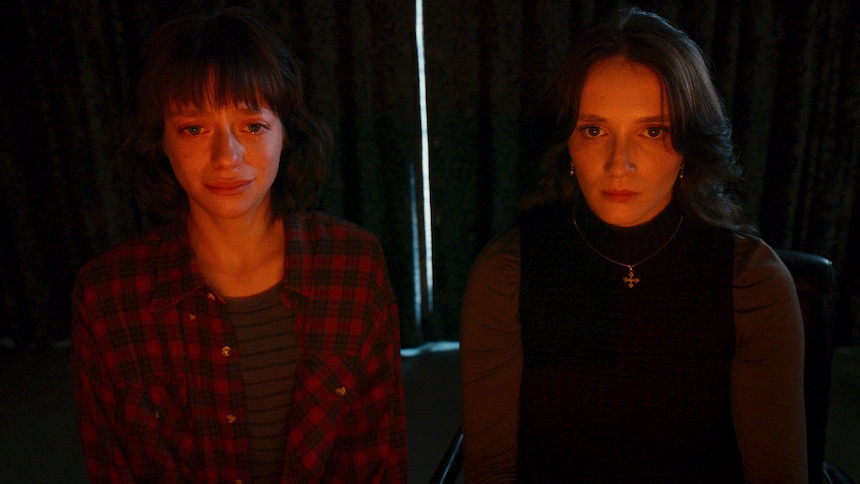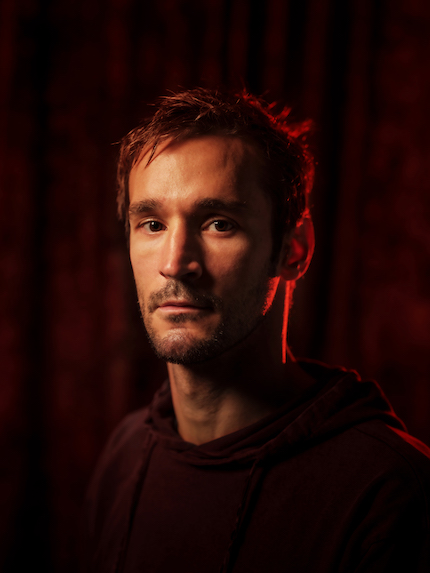RED ROOMS Interview, Part 2: Pascal Plante Talks the Music and Ethics of His Thriller

In part 1 of our interview, Red Rooms filmmaker Pascal Plante talked extensively about how individual scenes were designed and shot. In part 2, we got more into the musical score and the ethics of making his thriller. Red Rooms opens Friday in limited release via Utopia.
You were just talking about the opening where she [Kelly-Anne played by Juliette Gariépy] wakes up. Part of what immediately drew me in is the score, that incredible classical piece that Dominique [Plante] wrote. And I was curious, did you two talk about sort of the genres and the types of music that he would create beforehand, or did he come up with all of that and then bring it to you? Because it goes from classical to noise to just...
Noise, almost metal music, yeah. Well, so he's my brother, Dominique. It's his first score, he did a few bits and pieces in some of my shorts, but never like a proper score. Because that's like almost 40 minutes of original music and it's a big gig for him [laughs].
But yeah, I'm a big music lover. And when I write, I write with music so I had kind of a musical mood board for the film, which included some of the songs that end up in the film. Like there's an Australian artist, her name is Uboa. She did an album called The Origin of My Depression and I was listening to that while writing.
My next question is about Uboa and Ada Rook.
[laughter]
Okay, nice. But I was listening to a lot of one artist who did not agree, and it's okay, to have her song in the film. Her name is Lingua Ignota and she blends metal and noise with like Baroque classical sounding music. And for some reason, I listened to a lot of Lingua Ignota while writing, so the mix of genres made sense-ish, I felt, for Kelly-Anne.
So when I was talking with Dominique, I was like "so yeah, there's Baroque funeral marches in there, there's like metal, noise, a dash of electronic music." Which Lingua Ignota doesn't necessarily use, maybe Uboa does a bit to a certain extent. And somehow we make it work. But these felt very disparate, like opposite sides of genres that needed to coalesce into something.
Basically the only other note I gave him was, "I love melody." I think a lot of modern film scores shy away from melody. I don't know why. Like all the scores that I love I can hum after when the film ends. So I said to my brother, basically build the whole thing based around a melody that is really repetitive, that a five-year-old can hum, that haunts the whole soundtrack and you can shape in many ways throughout the score. And so he came up with this very simple melody line that's being flipped around the whole time.
Maybe one last thing to say about music is that I put temp tracks on the whole film. Some of them we got attached to and we licensed. Some of them we removed but then my brother was like, "okay this is what you liked about that song, let's try to keep what you liked about it but also have a sound palette that unifies the whole score." That's the DNA of the film, that's part of the film's personality.
I have a Lingua Ignota t-shirt. I'm not wearing it because I thought the MANIAC shirt was relevant, but now I wish I were wearing my Lingua Ignota shirt.
[laughter]
 No, it's fine. But you know, her work comes from a place of trauma, the film deals [with traumatic material], I almost did not expect [us to get the licensing rights]. But I'll give you one hint. If you align the first impact of the song "Butcher of the World" off her [album Caligula] with when the killer looks in the camera then this whole slow motion piece, the full scene works perfectly. It works perfectly for like a full two, three minutes. That's because we actually edited this sequence off that song so we had to match that song with an original score after, but like, it's all [timed] to that song.
No, it's fine. But you know, her work comes from a place of trauma, the film deals [with traumatic material], I almost did not expect [us to get the licensing rights]. But I'll give you one hint. If you align the first impact of the song "Butcher of the World" off her [album Caligula] with when the killer looks in the camera then this whole slow motion piece, the full scene works perfectly. It works perfectly for like a full two, three minutes. That's because we actually edited this sequence off that song so we had to match that song with an original score after, but like, it's all [timed] to that song.
Yeah, I definitely plan on watching the movie again so I'll queue that up and do that. Were there any other artists you can tell me about that you were listening to while writing?
Oh, I can actually open up my Spotify. Oh no, it's on my iTunes because the playlists that end up on Spotify are not the same as my mood boards.
Okay, yeah. Early Slow Dive, like Avalyn I & II, Swans, Anna von Hausswolff. yeule, Sewerslvt, Sophie, some Arca, some Loreena McKennitt, and one last would be Matt Elliott because he does a lot of repetitive, kind of obsessive sounding songs so my brother could tap into that rhythm.
But yeah, all pretty depressing stuff. [laughs] I was writing about human trafficking, listening to that.
Not the most fun headspace.
Yeah, yeah.
So I know you're doing a lot of press. Is there anything that you haven't gotten to talk about that you want to talk about?
A [question in a] Q&A got me thinking a lot. Because I try to be as ethical as possible with the subject matter, even though I'm still doing a thriller so it kind of has to appeal to the demographics that I also want to somehow question. So people that are into horror, thriller, true crime, all that.
But someone asked me in a Q&A: "Do you feel a sense of responsibility towards the audience? Because [it may inspire] some audience member to tap into some of the darker stuff that is online. Do you feel some sense of responsibility for that?"
It's a big question. And to me, I guess the answer is yes. But then the answer is also, I cannot be responsible for like the "bad fans," let's call it that. Like, you know how Kubrick made A Clockwork Orange, and then there were like hooligans in the UK.
And of course they didn't get the point, the point was the exact opposite. Fight Club has a toxic fan base. I can go on naming a lot of films that are clever, that are trying to depict something, criticize something, and yet they show a subculture, and on a surface level, it can potentially arouse some people in the wrong way.
I'm still debating that sense of responsibility. I'm trying to make it as ethically as possible. I'm just bringing up the most challenging thing I've [experienced] doing that promo. Which now that the film is done, like what if one case ends up becoming someone who maybe saw the film? That would be extremely devastating, of course because that's not the intent. But then is art, is fiction responsible?
And depicting something is also knowledge. So knowledge is not bad in itself at all. Like just knowing that something exists. Because the other way of thinking would be like, "oh, let's just not do any sexual education so the children will not know that sex exists" but that [can lead young people to engage sex] in a less safe way.
I'm rambling because this is literally the most challenging thing I've encountered [doing press for the film] and I'm still kind of struggling [with it.]







